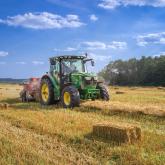
EXERCISE CAUTION WHEN FACED WITH THE BIODIVERSITY POT OF GOLD
Published 23 December 2023
As 2023 draws to a close and we finally leave BPS behind, and with ELMs and ‘public money for public goods’ firmly established in the agricultural world, yet another initiative finally looks like being one of the main issues in the new year: Biodiversity Net Gain (BNG), writes Simon Evans.
Of course, 2024 will be a general election year, and one thing we can be certain of is that housing is likely to be a key political battleground. In Norfolk that is particularly apposite, because the Nutrient Neutrality issue has brought house building to a virtual standstill in much of the county – and BNG will almost certainly be part of the solution to that long-running problem.
But biodiversity issues run deeper than Nutrient Neutrality. From 1st January 2024, developers must ensure that their activity leaves the biodiversity of an area actually enhanced once they have completed their work. Achieving that will mean purchasing credits, and these will be created by landowners, and especially farmers, creating biodiverse habitats on their land, often at the direct expense of food production.
To some, that will sound like easy money, accepting a 30 year covenant to be paid money for essentially not working the land (although they will have to create and maintain the habitat during that period). It is suggested that the payment for a high-paying habitat may be £120,000 per hectare, £1,600 per acre per annum for each year of the covenant.
At a time when the ‘Brexit replacement’ pot of money is about to expire (it was only guaranteed until the end of this parliament), those payments may sound tempting. With the public finances already stretched, the temptation to replace uncertain public payments with guaranteed money coming from developers could be politically and economically compelling.
However, I would counsel some caution before locking up land in this way for three decades. These payments may sound generous today, but will it still seem so bountiful in 30 years’ time? Or will BNG covenants effectively reduce land values, as well as creating all sorts of succession and potential inheritance tax issues?
Remember also that political priorities can change, both in the short-term (many now see a change of government in 2024 as virtually inevitable) and in the longer-term.
When I first started in practice in the 1980s, agricultural policy was all about maximising production, with grants available for things like removing hedges and land drainage. Now we are receiving public money to put them back and maintain them, but there is no guarantee that in 30 years things won’t have gone full circle.
If climate change and food security issues mean that food production rather than environmental stewardship becomes the imperative in decades to come, those who took the money to lock up their land for 30 years in biodiversity covenants may live to regret their decision. There is a place in the agricultural sector to accommodate the developers requirements, but consider carefully ‘what’ and ‘where’.
Share this story
Arnolds Keys Blog

DON’T WAIT FOR THE POLITICIANS – GRASP THE SUSTAINABILITY NETTLE NOW
13 December 2023
The mixed messages coming from the COP28 conference in the United Arab Emirates, along with our own government’s application of the brakes in recent months on several sustainability measures, suggests... Read more >

THE LETTINGS YEAR AHEAD
8 December 2023
This is the time of year when it is traditional to reflect on the past 12 months and make some predictions for the future, write Phil Cooper and Catherine Hunt. Read more >

DON’T GET SNOWED UNDER IN THE BOXING DAY BLIZZARD
1 December 2023
Boxing Day: it’s a peculiarly British phenomenon, writes Natasha Wright. It dates back to the 19th century, when wealthy families would pack gifts in boxes for the less fortunate. Read more >

COPING WITH THE ENFORCEMENT OFFICER’S CALL
25 November 2023
This month has seen the start of a programme of farm visits by Health and Safety Executive Pesticide Enforcement Officers, with the aim of enforcing rules about the management of... Read more >
